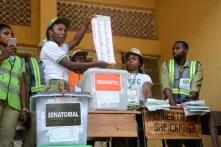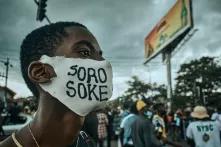Nigeria has a rich history of activism, as courageous women and men have always stood up to state repression, from colonial times, throughout the military era and until today. The 2020 #EndSARS protests propelled a youthful new generation to the forefront of this activism — often referred to as the soro soke generation, namely the generation that speaks up. What started as a protest against police brutality quickly evolved into a broader political call for better governance.
Rinu Oduala, also known as Savvy Rinu, is one of those young activists. Following her active participation in the nationwide protests, she was appointed as a youth representative to the Lagos Judicial Panel on Police Brutality but withdrew from that role two months after. However, she continues to be a vocal voice in the country’s political affairs, challenging Nigeria's political class to do better. We spoke to Rinu about the legacy of the #EndSARS protests and her views on the future of politics in Nigeria.

What is the legacy of the #EndSARS protests in Nigerian politics and the youth’s attitude towards it?
Rinu Oduala: It is a powerful, strong legacy of heroism, hope, anger, passion, solidarity, sacrifice and resistance. Due to many years of military administration, state violence and impunity are strongly established in Nigerian culture. The Nigerian Security Forces, made up of the military, police and domestic intelligence agencies that protect the ruling elite, are notorious for targeting civilians, abusing human rights and using excessive force. The #EndSARS movement was revolutionary. It drew the global attention of numerous world figures, including US President Joe Biden and UN Secretary-General António Guterres, and it demonstrated the resolve of the Nigerian people to fight for their rights.
Young people who want a better Nigeria drove the #EndSARS protests in order to highlight the endemic corruption and impunity in the Nigerian police force, as well as how unwilling the Nigerian government is to address difficult policy issues like criminal justice reform. The authoritarian political climate and lack of accountability/justice in the nation that permits the police to violate civil rights by hurting, maiming, torturing and killing individuals with impunity were brought to the attention of the world.
Additionally, it brought to light the appalling state of bad governance in terms of Nigeria's government, which has reduced the country to little more than a shell. Young Nigerians who are fighting the government's use of violence and police brutality have chosen #EndSARS as their rallying mantra. We are fighting for every Nigerian who has been killed by the same police who are tasked with keeping them safe. We are struggling for a shift in the system. We are struggling for both justice and our lives.
There was significant female representation at the forefront of the #EndSARS protests. Do you think this had a lasting impact on gender equity and inclusivity in the civic space?
Rinu Oduala: Yes, I think that the impact is incalculable. Growing up as a woman in Nigeria, you were continuously admonished by the ethno-religious society that told you that you only needed to be seen and not heard; therefore, you had to struggle harder than necessary to get your opinion heard. However, women have been leading nonviolent demonstrations and dialogues in Nigeria for good governance and accountability, and this did not start in 2020. Nigeria produces strong women who are resilient to years of societal injustice and persecution and are instilled with confidence. It is hardly surprising that women were at the centre of the #EndSARS protests.
From the Aba Women's Riots in 1929, which saw more than 50 women slaughtered, to the Abeokuta Women's Union in the 1940s, women have played a crucial role in Nigeria's social movements. Names like Ifeoma Abugu, Pamela, the over 65 women arrested in Abuja nightclubs and raped by police officers, Adaobi Jessica, Blessing Isabor and Tina Ezekwe are only a few examples of what Nigerian women have gone through and are currently experiencing at the hands of criminals wearing police uniforms. Due to our historical experiences and the #EndSARS protests, women are now calling for more equitable access and rights, and speaking up, even if we face ongoing discrimination, are underrepresented in important positions and have an unacceptable level of involvement in policy and governance. We have amplified our voices and our participation to the point where we represent liberation and progress, and so our country and the world must accept us.
The #EndSARS protests have demonstrated the “power of the streets” and created a lot of enthusiasm, but should not more youth join political parties to work through the political system in order to gain direct influence on political decision-making?
Rinu Oduala: Nigeria's politics plays a significant role in why young people are opting to engage in participatory politics rather than join political parties.
There is a lack of transparency and shortcomings in the current political institutions, which contributes to why young people do not join political parties to work through the political system. It is not that they do not desire to be leaders and have an impact through political decision-making.
Young people who don’t have the resources to participate in party politics are effectively disenfranchised by the monetisation of the political space. For example, in the ruling party, nomination forms for aspirants of the 2023 presidential ticket cost N100 million, and governorship aspirants have to pay half that amount. People under the age of 40 receive a 50% discount, but the challenge remains.
There is also a mistrust of traditional political institutions because of our cultural norms that state that women should not participate in politics and that politics belongs only to males.
The truism that young people will be tomorrow's leaders in Nigeria raises crucial questions about accessibility and investments made in young people to prepare them for their leadership roles.
What are your hopes and fears for the 2023 elections as a young Nigerian?
Rinu Oduala: My fear is that the status quo might persist due to electoral manipulation, the exploitation of violence, poverty, ignorance and ethno-religious prejudices, as well as voter disenfranchisement.
My hopes are with my generation. Even if we do not attain the results we want now, we will be forced to move forward and higher towards our goals. Those in power seem to not believe in this country as there is a lack of political will and patriotic zeal to address our problems.
How important do you think is it for the youth to come out and vote?
Rinu Oduala: It is crucial that young people come out to vote, because Nigeria is all we have and because we have the right to demand that it works for all of us. There is no better place to start holding leaders accountable in a democracy than the polling booth. Young people make up more than 60% of the Nigerian population, a demographic that has experienced nothing but harassment, injustice and unemployment at the hands of security forces, as well as unsafe environments created by the government, which is meant to create an enabling environment. As a result, we have become victims of the broken system, with no access to justice. We cannot continue electing the same leaders who have robbed our future generations of their future, and asking for dignity from people who benefit from our indignity. Young Nigerians' voices are being suppressed in an environment that ought to empower them to speak out. Nigerians are dying every day due to incompetence. We have been abandoned by a careless and oppressive system. We need a future in which we can look back and not regret living. We need a Nigeria where the police and all other law enforcement agencies never, ever physically assault or infringe on a citizen's rights. A Nigeria where the common man will matter. Where opportunities will be available to all, not just the children of the elite/political class. A Nigeria where we won’t be cut down in our prime. A Nigeria that will be filled with accountable government officials, where all forms of oppression and injustice are a thing of the past. A Nigeria that will work for all. It's time to choose leaders who will serve the needs of the people rather than their own interests.
How do you see Nigeria’s political future evolving, and what is the inspiration for you to keep on participating in it?
Rinu Oduala: One that will involve more young people. As the resilient and dynamic people we are, we will find ways to evolve. My generation's dynamism, a generation where we are all actively speaking up serves as my source of inspiration. In the Nigeria we are speaking up for, it would not matter that I am a child of nobody coming from the average Nigerian home. The Nigeria we are advocating for gives every voice equal weight and defends every intrinsic right, including mine. We also understand now that there will be resistance to change; however, without change, things will never get better, because our fight is for equity. Otherwise, there is no future for my generation and the generations to come.
The views expressed are those of the interviewee and do not reflect the views or position of the Heinrich Boell Foundation.


